 Petzlover
Petzlover Oriental Longhair is originated from United Kingdom but Oriental Bicolour is originated from United States. Both Oriental Longhair and Oriental Bicolour are having almost same weight. Both Oriental Longhair and Oriental Bicolour has same life span. Both Oriental Longhair and Oriental Bicolour has same litter size. Oriental Longhair requires Moderate Maintenance. But Oriental Bicolour requires Low Maintenance
Oriental Longhair is originated from United Kingdom but Oriental Bicolour is originated from United States. Both Oriental Longhair and Oriental Bicolour are having almost same weight. Both Oriental Longhair and Oriental Bicolour has same life span. Both Oriental Longhair and Oriental Bicolour has same litter size. Oriental Longhair requires Moderate Maintenance. But Oriental Bicolour requires Low Maintenance
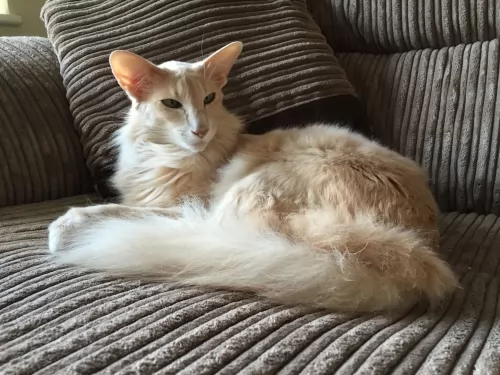 Your Oriental Longhair cat has his foundations in the Siamese breed. The Siamese came from Thailand to the UK in the 1800s.
Your Oriental Longhair cat has his foundations in the Siamese breed. The Siamese came from Thailand to the UK in the 1800s.
Sometimes a litter of Siamese kittens produced a long-haired variety but in the 1950s breeders started honing in on these longer haired Siamese cats.
Various crossings took place and Oriental Shorthairs came about. By breeding these Shorthairs with Balinese cats, the Oriental Longhair came about in the 1970s.
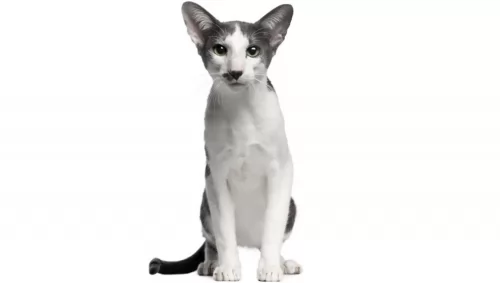 Oriental Bicolour cats owe their origins to Lindajean Grillo of Ciara Cattery. The cats hail from the United States. It was in 1979 that Grillo paired a Siamese and bicolored American Shorthair, selecting the best bicolored offspring to mate again with Siamese or Orientals.
Oriental Bicolour cats owe their origins to Lindajean Grillo of Ciara Cattery. The cats hail from the United States. It was in 1979 that Grillo paired a Siamese and bicolored American Shorthair, selecting the best bicolored offspring to mate again with Siamese or Orientals.
This particular variety was granted recognition in 1983 by TICA. It was during the 1980s that European breeders started their own Oriental bicolor breeding lines. The first modern Oriental Bicolours were imported to the UK during 2004.
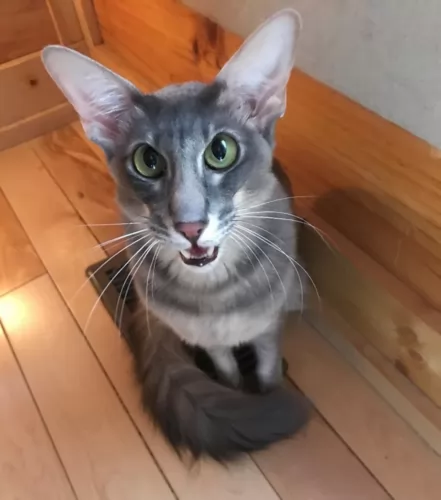 The Oriental Longhair is a medium-sized cat with a fairly long, muscular, lean body. The Oriental Longhair actually resembles the Siamese cat.
The Oriental Longhair is a medium-sized cat with a fairly long, muscular, lean body. The Oriental Longhair actually resembles the Siamese cat.
They also come in an outstanding array of colors and patterns with the coat being long and silky. The coat can be a solid color but you can also find tabby-type coats as well as tipped coats. The cat doesn’t have an undercoat and coat lies fairly flat against the body. You will also hear it being referred to as a semi-longhair.
The tail is attractive and forms quite a bushy plume.
The Oriental Longhair cat has almond-shaped green eyes. If you see the white Orientals, they can have green or blue eyes. They can also be odd-eyed.
These cats are intelligent, curious, and good-natured and they love to talk. Therefore it is important that such a cat breed have a home where there is plenty of company.
They’re active cats too, loving to play and bound and leap. He'll want to willingly join in with some of your games. The cat will certainly need some exciting toys to keep him occupied.
They are loyal cats and become loving and devoted to their human family, getting on well with children in the home as well as other pets.
They don’t like being left alone at all and will prefer to have company, even if it is from another pet.
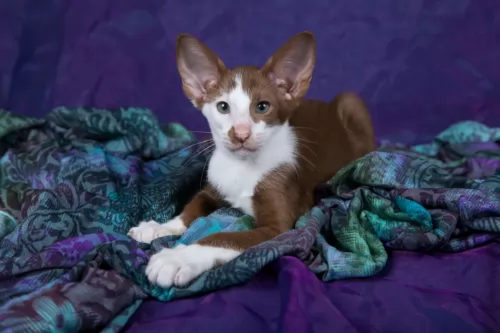 These cats with a triangular-shaped head and slender, long body have a fairly thin tail. The ears are widely set and are large. The eyes are green, but blue with the colorpoint varieties.
These cats with a triangular-shaped head and slender, long body have a fairly thin tail. The ears are widely set and are large. The eyes are green, but blue with the colorpoint varieties.
The coat is short, close-lying and sleek while the coat of the long-haired variety is fine and silky with no thick undercoat. The tail forms a plume. The coat is mostly white and the other part of the coat can be in any other color. You’ll always see quite a bit of white around the legs.
These cats are suited for singles, couples, families, and seniors - in fact, anyone still active enough to provide this cat with lots of attention.
These vibrant cats are known for their social, friendly and loving personality. They are intelligent, inquisitive, active cats that need to have plenty of interaction with their human family members. They love their human family and love to hold conversations with them.
They're entertaining too, and love nothing more to ve the center of attention. They're so into their human family that you may even have him waiting patiently for you to come home fro work. He shouldn't be left alone for hours on end and should rather have a pet friend to keep him company during the day.
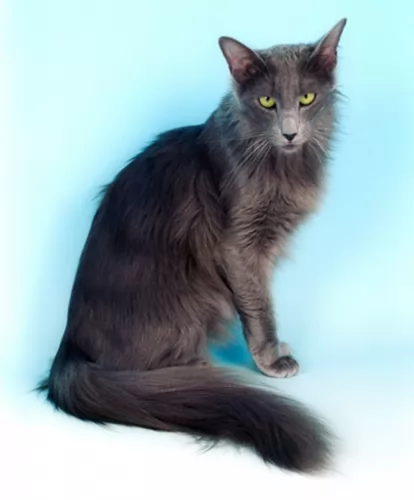 Your Oriental Longhair is such a friendly, lively cat and he makes a splendid companion. It is an inquisitive cat and likes to be part of the activity in the household.
Your Oriental Longhair is such a friendly, lively cat and he makes a splendid companion. It is an inquisitive cat and likes to be part of the activity in the household.
He is a social, talkative cat and has always got a lot to say/ They love the attention of their human family and don’t like being separated too long from them.
When you get one of these cats, you get both an entertainer and a friend.
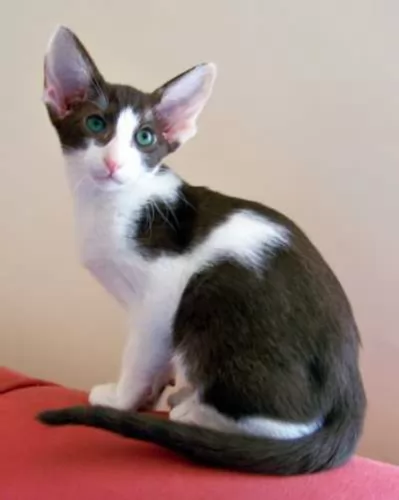 The Oriental Bicolor is such a wonderful pet to have. They are intelligent, entertaining, loving, active, playful, and inquisitive.
The Oriental Bicolor is such a wonderful pet to have. They are intelligent, entertaining, loving, active, playful, and inquisitive.
They’re also athletic and energetic. These cats have got all the characteristics you want in a good friend. They make a fantastic companion to people who are active and happy. They’re also very vocal and have a lot to say to their human family.
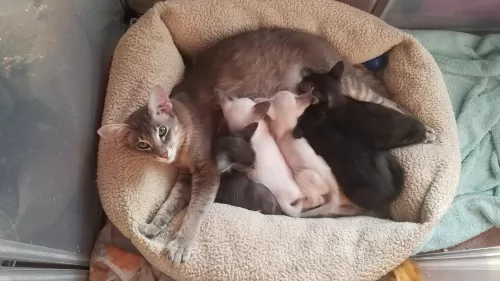 The Oriental Longhair is generally considered a healthy breed. Because the cat can be prone to some inherited conditions, it is always a wise move to buy a kitten from a reputable breeder.
The Oriental Longhair is generally considered a healthy breed. Because the cat can be prone to some inherited conditions, it is always a wise move to buy a kitten from a reputable breeder.
A couple of these diseases to look out for include Progressive Retinol Atrophy which is a degenerative condition that can lead to blindness.
Also, look out for periodontal disease which is common in many cat breeds.
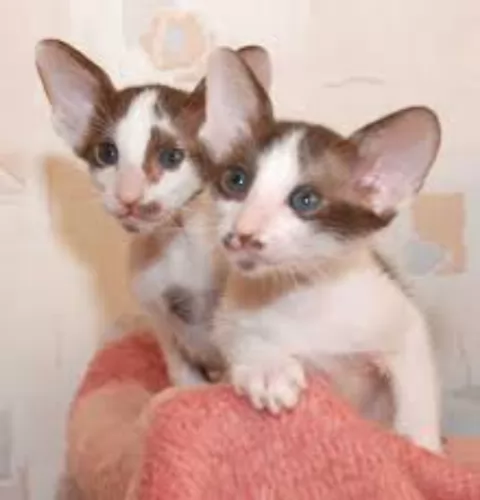 Any cat can develop health problems. Even kittens that come with a certificate of health can develop illnesses that you never thought possible.
Any cat can develop health problems. Even kittens that come with a certificate of health can develop illnesses that you never thought possible.
Orientals are generally healthy cats, but the health issues that may affect the Oriental are similar to that of the Siamese cat.
One of these is Progressive Retinal Atrophy (PRA). This is a genetic eye problem that can lead to blindness. Another disease to look out for is Asthma. The Siamese is susceptible to this disease which means your Oriental Bicolor will also be. You will have to get your furry friend to the vet who may precribe anti-inflammatory drugs.
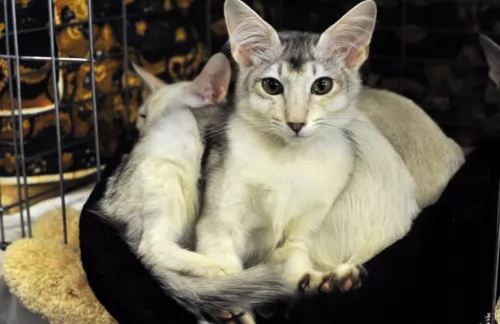 This is a slim cat and you can easily tell when he has put on weight. Be very careful with how much you feed your cat and what you feed him.
This is a slim cat and you can easily tell when he has put on weight. Be very careful with how much you feed your cat and what you feed him.
Cats are carnivores and you need to ensure that his diet is rich in meaty ingredients. These cats have long slim legs and extra weight can put pressure on the cat’s joints. Keep your cat lean and healthy. If in any doubt about diet for your cat, speak to your vet, Always ensure a bowl of fresh, cool water.
Prepare to have a cat included in your family. Invest in food and water bowls, a cat bed, grooming brushes, toys, climbing tree, scratching post and litter box. A cat box for transporting your pet to the vet is also a good idea.
The Oriental Longhair loves to leap up into high areas so he will need a climbing tree. Try to get your cat out into the sunshine where possible and allow him to climb into a tree.
The cat’s medium- to long hair will require brushing once or twice a week. When you brush your pet gently but purposefully, he loves it and it becomes a bonding session.
Provide your cat with a litterbox and make sure to clean out the box every day. You can do that by buying a small plastic rake at the pet shop and it keeps the litter nice and even for your pet.
Have your cat neutered or spayed to prevent unwanted kittens.
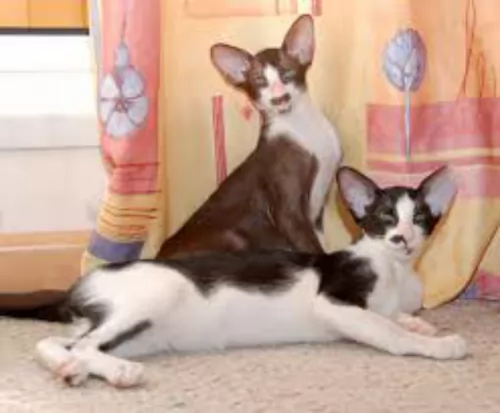 The Oriental Bicolor will require a brushing once a week. A good idea is to also take a warm, damp cloth and to wipe your cat down. It’s an excellent way to rid your cat of loose hairs as well as dust. The cat has a sparse coat, so brush him gently.
The Oriental Bicolor will require a brushing once a week. A good idea is to also take a warm, damp cloth and to wipe your cat down. It’s an excellent way to rid your cat of loose hairs as well as dust. The cat has a sparse coat, so brush him gently.
Other grooming requires nail clipping and checking inside his ears. If you clean his ears, be careful not to go deep into the ear. It is precisely why so many cat owners take their cat to the pet groomers where they can do these things professionally.
It’s very important to keep your Bicolor’s litter box spotlessly clean because like most cats, they won’t use their litterbox if it’s still got yesterday’s feces in it. It needs to be cleaned every day.
The Oriental’s diet is much like that of other cats – it has to be meaty. You can’t afford to not understand your feline pet’s dietary needs. Cats are carnivorous and they need commercial cat food that will be equal to fresh meat that they would normally find in the wild.
They need foods high in protein but they will still need some carbohydrates, amino acids, and vitamins, and minerals. Always go for the best quality pet cat foods because by buying the poorer quality ones you put your cat at risk of developing health problems. Never ever leave your cat without a constant supply of fresh, cool drinking water.
Supply your cat with all the things that make it a pleasure to have a cat. You don’t want to bring your pet home and only then start looking for things to make him at home. He’ll need food and water bowls, a nice warm, soft bed, a litter box, grooming accessories, collar, toys climbing tree and scratching pole.
Have your pet neutered or spayed to prevent unwanted kittens.
Make sure he is taken to the vet when ill. You shouldn't own a pet if you can't afford to pay vet fees. There are some cat illnesses that can make your cat very sick and uncomfortable. He should have his vaccines and also be treated for parasites.